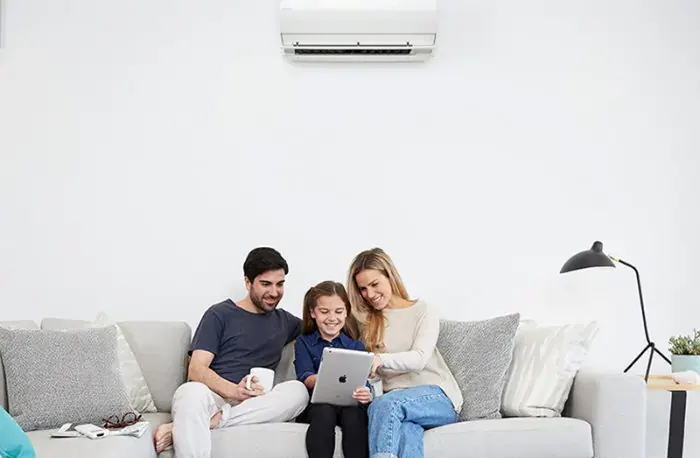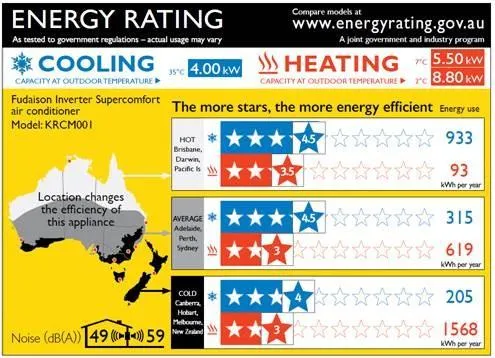How Much Does it Cost to Run Air Conditioning?
Air conditioning is an indispensable addition for both residences and commercial establishments, as it provides essential comfort for occupants by regulating indoor climate throughout the year. You might have heard that operating air conditioning comes with a hefty price tag, suggesting alternatives like fans in summer or heaters in winter, might be the more cost-effective option. But is this the best approach?
The cost of running an air conditioner depends on several factors, while the specific costs can vary depending on energy rates, climate, and the efficiency of the systems involved, cooling typically tends to be more expensive than heating when running an air conditioner. Keep in mind that while running an air conditioner provides comfort, it's essential to balance that with energy efficiency to keep costs down and reduce environmental impact. Opting for a split system air conditioning unit typically offers the lowest energy consumption and is the most cost-effective to run.

General Guidelines for Cost Estimates:
A simple way to estimate the cost is to use the following formula:
Cost per hour = (Power consumption of AC in kW) × (Electricity rate per kWh) You can find the power consumption of your air conditioner in its specifications, usually measured in watts or kilowatts (kW). Then multiply it by the number of hours you run it to get the daily or monthly cost. The zoned energy rating label shows the energy use in kWh per year for heating and cooling for each of the three climate zones. When looking to purchase an air conditioner look for one that has an EER ( Energy Efficiency Ratio ) of 8.5 and above. Also bear in mind that the higher SEER (Seasonal Energy Efficiency Ration) rating signifies greater efficiency.

Factors that Affect Air Conditioner Running Costs :
Several factors influence the running costs of air conditioning systems, and being aware of what they are can help you make informed decisions on how to optimise energy usage and minimise air conditioning running costs. These factors are:
- Type of Air Conditioner - The cost can vary depending on whether you're using a central air conditioning system, a window unit, a portable unit, or a ductless mini-split system.
- Energy efficiency Newer models are generally more energy-efficient, which means they consume less electricity and cost less to run.
- Size of the Air Conditioner The size of the unit and its cooling capacity affect how much energy it consumes. A larger unit will typically consume more electricity.
- Local Electricity Rates The cost of electricity varies widely depending on where you live. Some regions have higher electricity rates than others.
- Usage Patterns How often and how long you run your air conditioner also plays a significant role in determining its running costs.
- Maintenance - Regular maintenance and servicing such as cleaning filters, checking refrigerant levels, and ensuring proper insulation can affect the efficiency of the air conditioner, thus impacting its running costs.
Why is Air Conditioning Cooling Mode More Costly?
Air conditioners can be purchased for cool-only purposes, referred to as single-function air conditioning, they are ideal if you live in a region where cooling alone suffices. In Australia where there is a noticeable change in season temperatures reverse cycle air conditioning is the preferred AC option. If you do have a reverse cycle and use it during the summer months AC you may have noticed the increase in energy consumption. The reason is
- Energy Efficiency Differences - Air conditioning systems generally require more energy to cool air than heating systems need to heat air. This is because air conditioning involves removing heat from the indoor air and releasing it outside, which requires energy to operate compressors and fans.
- Climate Considerations In many regions, particularly in warmer climates or during hot seasons, air conditioning is used more frequently and for more extended periods compared to heating. This prolonged usage can contribute to higher cooling costs.
- Temperature Differential - The temperature difference between the desired indoor temperature and the outdoor temperature can be more significant for cooling than for heating, particularly in hot climates. This larger temperature differential requires more energy to maintain indoor comfort during cooling.
- Efficiency of Heat Sources - Heating systems often include options such as natural gas, propane, or electric resistance heating, with electric being the most expensive option. However, even with electric heating, the efficiency of heating systems is generally higher compared to air conditioning systems.
- Insulation and Building Design - Heating can sometimes benefit from passive solar heating or better insulation in the building envelope, which reduces the workload on the heating system. However, cooling may require more energy-intensive strategies like air sealing and the use of shading devices to minimise heat gain.
If you have any questions regarding air conditioning and would like to speak to an air conditioning specialist call 1300 016 671 and one of our First Call Electrical team members will gladly assist you.
References
https://www.canstarblue.com.au/appliances/how-much-electricity-does-aircon-use/
https://www.choice.com.au/home-and-living/cooling/air-conditioners/articles/air-conditioner-energy-saving-tips
